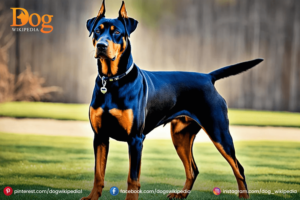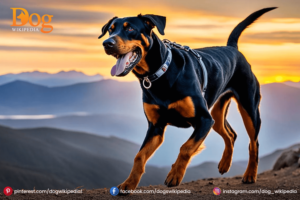Doberman Rottweiler: Introduction
Discover the glories of genetic diversity with Mishka, the amazing Doberman Rottwelier hybrid. Similar to how human siblings receive distinct characteristics from their parents, Mishka blends the greatest aspects of her Rottweiler and Doberman ancestry. Her agile personality and athletic form are reminiscent of her Doberman heritage, but her Rottweiler bloodlines give her a protective sense and a devoted heart.
Because of this unique genetic combination, Mishka is a loyal guardian, a loving companion, and a clever learner—a real testament to her parent breeds. Like the distinctive qualities that come from having a mixed heritage, Mishka’s remarkable looks and charming demeanor demonstrate that mixed heritage may produce genuinely remarkable result. The Rottweiler Doberman combines loyalty and strength, making it an ideal companion for active families and experienced owners.

Physical Characteristics of Rottweiler Doberman
1. Coat
Short, smooth, and dense
2. Color
Black, brown, or red with rust markings
3. Possible coat patterns
Solid, brindle, or piebald
Head and Facial Features of Rottweiler Doberman
1. Head shape
Wedge-shaped
2. Muzzle
Broad, flat
3. Eyes
Almond-shaped, dark brown
4. Ears
Triangular, erect
5. Nose
Black, slightly curved
Body and Limbs
1. Chest
Deep, broad
2. Shoulders
Muscular, sloping
3. Back
Straight, level
4. Legs
Strong, muscular
5. Paws
Oval-shaped, black
Other Characteristics
1. Tail: Docked or natural, carried with confidence
2. Bite: Scissor or level bite
3. Gait: Fluid, athletic movement
Personality and Temperament of Rottweiler Doberman
Characteristics
1. Faithful and Committed
2. Perceptive and Adaptable
3. Self-assured and brave
4. Playful and lively
5. Loving and affectionate
Climate
1. Watchful and protective
2. Independent and Strong-Willed
3. Vigilant and Reactive
4. Sensitive and emotional
5-Extrovent and gregarious (with appropriate)

Positive Characteristics OF Rottweiler Doberman
1. A Loyal Friend
2. Fast Learner
3. Agile and athletic
4. Kind to Family
5. Flexible
Adverse Characteristics
1. The possibility of aggression (in the absence of socialization)
2. Intransigence
3. Negative Conduct (without physical activity)
4. Stress and anxiety
5. Being overly cautious
Emotional Requirements of Rottweiler Doberman
1. Care and Love
2. Clearly Defined Limits and Uniformity
3. Exercise and Mental Stimulation
4. Play and Social Engagement 5. Positive Reinforcement Training.
Suitable Families
1 Active Families
Enjoy outdoor activities, exercise, and playtime.
2. Experienced Dog Owners
Familiar with training, socialization, and handling.
3. Families with older Children
Children should be aware of gentle interaction and boundaries
Family Dynamics
1 Children
Supervise interactions, teach gentle play.
2 Other pets
Introduce slowly, monitor behavior.
3 Elderly
Suitable companions, provide gentle exercise.
Family Benefits
1 Loyal companion
2 Protective instincts
3 Intelligent and trainable
4 Active playmate
5 Loving and affectionate
Challenges
1. Potential aggression (without socialization)
2. Strong-willed nature
3. Exercise requirements
4. Training needs
5. Health concerns (hip dysplasia, heart conditions)
Tips for Successful Integration
1. Establish clear boundaries and rules.
2. Provide consistent training and socialization.
3- Supervise Interaction

Conclusion
Conclusion of Doberman Maintaining a Rottweiler Doberman is comparatively simple. Few ailments affect this healthy breed. The Rottweiler Doberman requires regular grooming. It is a lovely breed that provides its owner with a nice companion. For the Rottweiler Doberman, training is essential. It is a clever breed that is devoted to its owner. Socialization is essential, nevertheless, to guarantee that they get along with both people and other animals.
Frequent veterinarian examinations are also necessary to keep an eye on their health and ward against possible problems like heart problems and hip dysplasia. Rottweilers, a Doberman-Rottweiler mix, typically live 10-14 years. They may face health issues like hip dysplasia and heart conditions. Highly trainable and loyal, they make great family pets but need regular grooming, exercise, and a balanced diet for optimal health.

